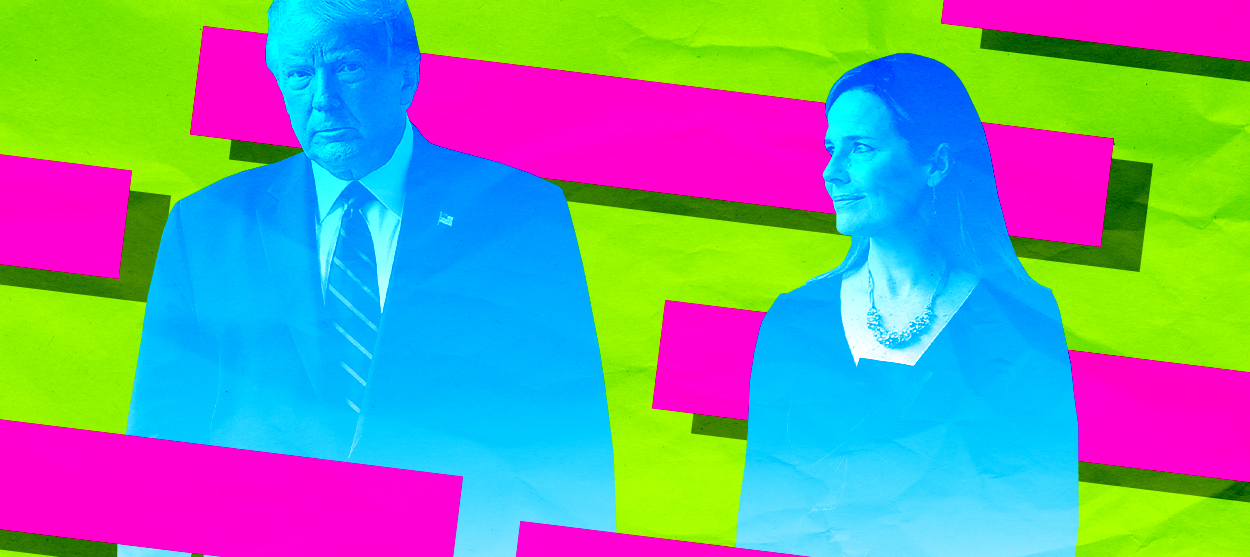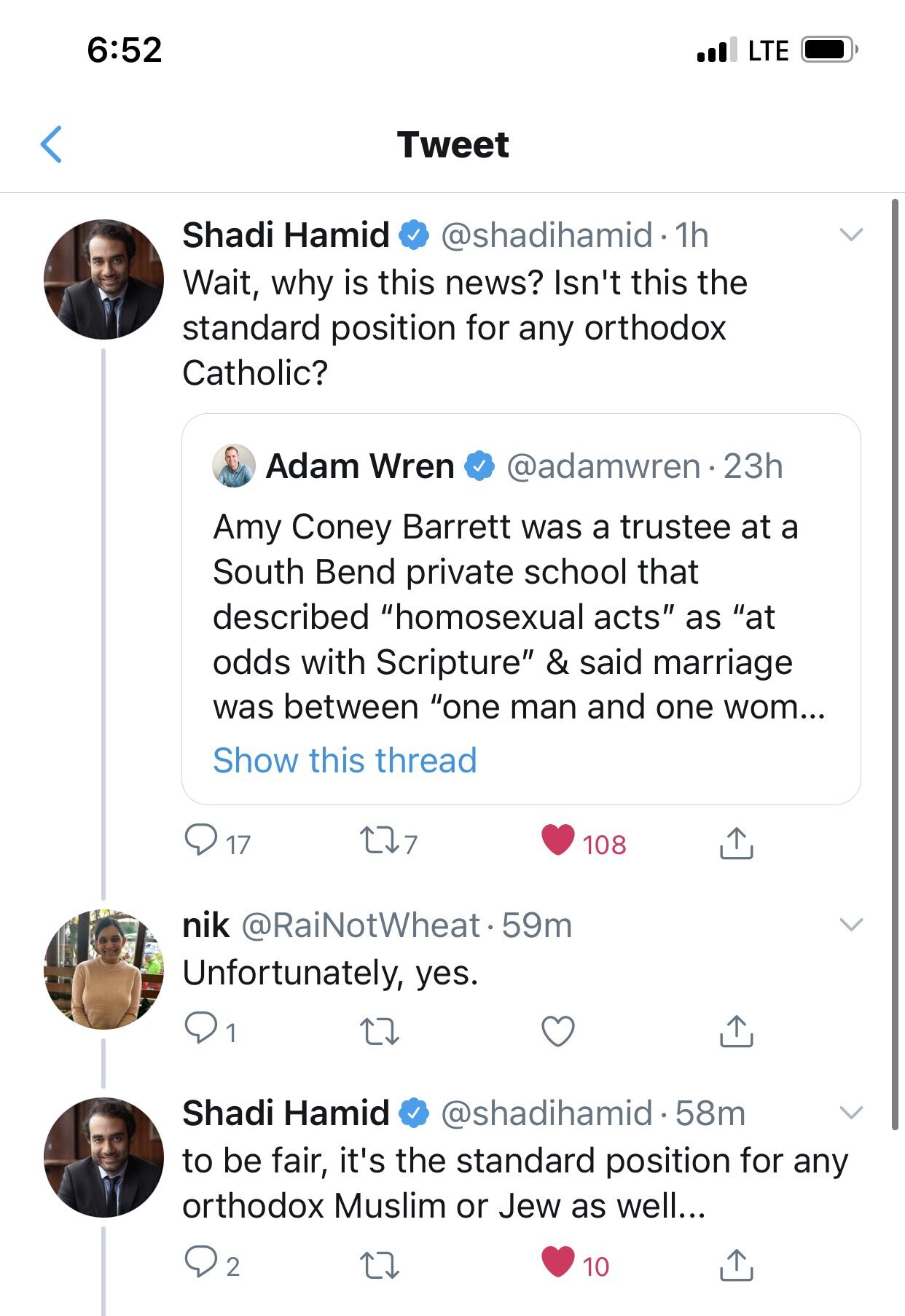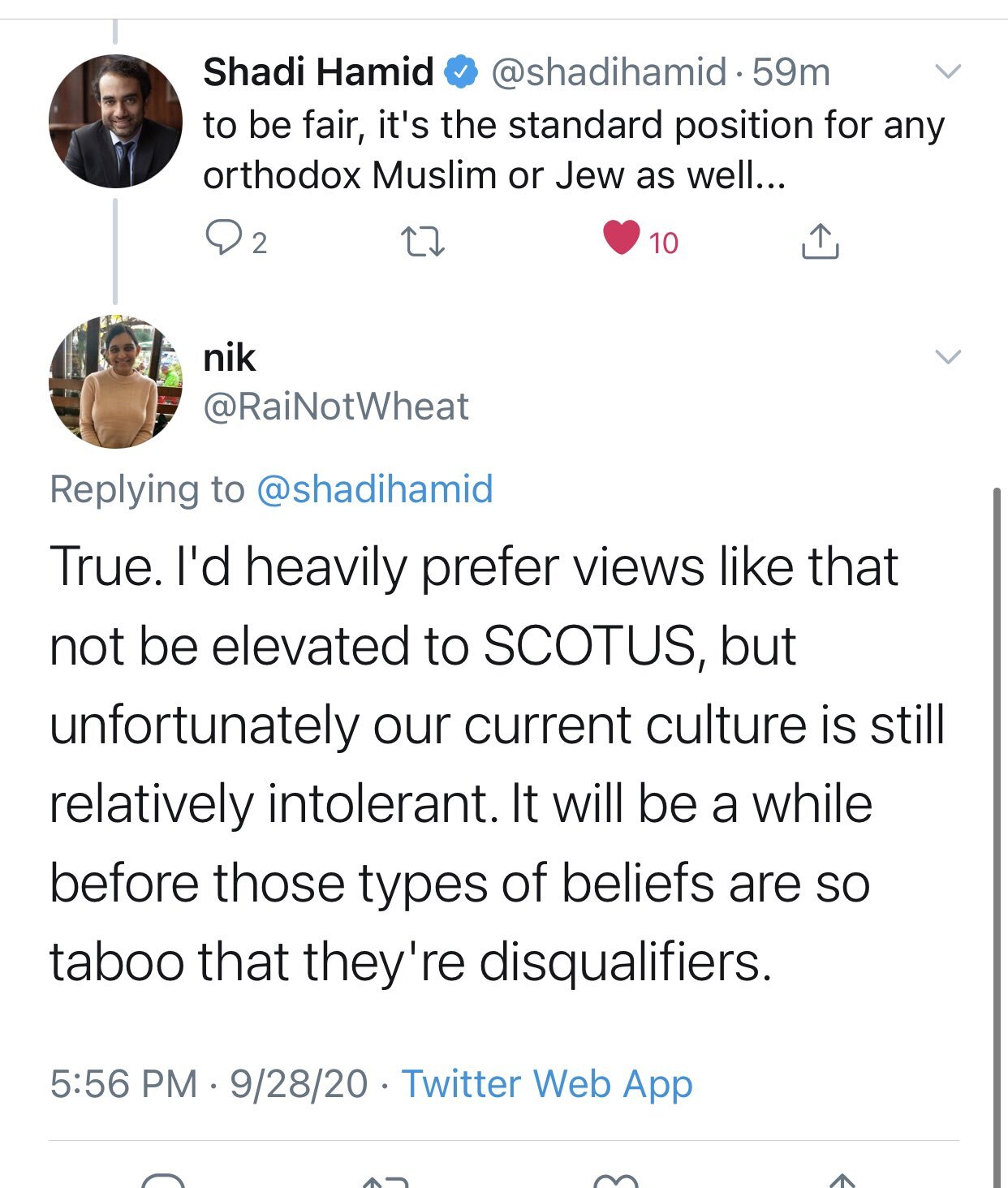Nominating Amy Coney Barrett is the best thing Trump has done in office
In praise of the Supreme Court pick


A free daily email with the biggest news stories of the day – and the best features from TheWeek.com
You are now subscribed
Your newsletter sign-up was successful
For more than two years, I have thought that Amy Coney Barrett was the single most qualified candidate that President Trump could nominate to the Supreme Court, and that his refusal to do so in 2018 was the greatest failure of his presidency. Now he's finally done it, and it's the best decision he has made in office.
Barrett's loudest critics seem to believe that instead of a conservative champion of textualism and originalism after the manner of her late mentor Antonin Scalia, Barrett is the special agent of that Romish man of sin bent on overthrowing the entire American constitutional order. Articles like this leave one with the impression that she is (to quote Émile Faguet on Joseph de Maistre):
A fierce absolutist, a furious theocrat, an intransigent legitimist, apostle of a monstrous trinity composed of pope, king and hangman, always and everywhere the champion of the hardest, narrowest and most inflexible dogmatism, a dark figure out of the Middle Ages, part learned doctor, part inquisitor, part executioner.
I have a hard time squaring any of what liberals say about Barrett with what is actually known of her opinions and character. So far from being some kind of bog-standard reactionary, she seems to be a woman of moderate and sensible views on most subjects (including the death penalty, which she opposes). If they were not hilariously incurious, Democrats and their allies in the media might recognize that People of Praise, the ecumenical charismatic organization to which she and her family belong, is not some kind of radical ultra-traditionalist sect but precisely the sort of group — extemporized prayer, guitar playing, etc. — to which traditionalist Catholics are allergic.
The Week
Escape your echo chamber. Get the facts behind the news, plus analysis from multiple perspectives.

Sign up for The Week's Free Newsletters
From our morning news briefing to a weekly Good News Newsletter, get the best of The Week delivered directly to your inbox.
From our morning news briefing to a weekly Good News Newsletter, get the best of The Week delivered directly to your inbox.
What, then, is Barrett's actual appeal? I hope to see her confirmed for a number of reasons.
First, because she is far more intellectually impressive than anyone whose name has appeared on Trump's much-vaunted lists of approved candidates. This is not only my view; it is also widely shared by current and former colleagues, including those who disagree with her on a wide range of judicial question such as Noah Feldman, who clerked with her on the Supreme Court in the late '90s.
Second, because I believe that the American people can do without another graduate of an Ivy League law school on the court, and very much could do with someone who has both attended and taught at a university whose football team has been relevant since the advent of the forward pass. This is not an abstract question about institutions (though it is remarkable that if confirmed she would be the only justice not to have earned her J.D. at either Harvard or Yale); it is about the very real differences in outlook and experience between people who have spent most of their lives in professional circles on the East Coast and those like Barrett, a Southern transplant to the Rust Belt, who have not.
Third, because Barrett is, as friends and coworkers have told us and she herself has revealed to the rest of the country, a woman of extraordinary decency, utterly gracious even in the face of rank bigotry and stupidity, someone whose personal reputation for generosity extends so far that I had heard reports of her kindness long before she was a national political figure. These were not all stories like this one told by Laura Wolk, the first blind woman to clerk for the Supreme Court, whom Barrett mentored in law school; in South Bend she is if anything more widely known for ordinary neighborly acts of charity (being the first person to volunteer yet again for the same thankless task involving children and vans and shaky logistics).
A free daily email with the biggest news stories of the day – and the best features from TheWeek.com
Fourth, because I believe that in 2020 there ought to be a mother on the Supreme Court. All the better that she be a mother of the sort of large family on the verge of being banished from polite social life in this country.
Fifth (and speaking of banishment), because people like the "deputy data director" for Joe Biden's presidential campaign gloat openly about the prospect of orthodox Catholic views about same-sex marriage becoming so "taboo" that no one who holds them is allowed to take part in public affairs. That day may come regardless, but I do not relish it, and it will almost certainly be forestalled by having Barrett on the high court.


Finally, because I am not given to dissembling, I should add that I would like to see Barrett confirmed because I am convinced that, given the opportunity, she would vote not only to overturn Roe v. Wade but to declare abortion illegal under the 14th Amendment, which states that no person shall be deprived of life without due process of law or denied its equal protection. I not only think such a decision possible but, assuming that at least four of her colleagues can be cowed into agreeing with her, even somewhat likely. And I believe in ways that I find almost impossible to express that it would be fitting for a woman, a mother of seven, a devoted wife, an advocate for disabled persons, to undo the hideous legally sanctioned desecration of the most intimate bond imaginable between two human beings. If Barrett were to write the majority opinion in such a case, its symbolic value would be of Wagnerian proportions: the undoing of a blasphemous social order founded upon the renunciation of love for power by one woman's renunciation of power for love. It would certainly mean her (almost literal) immolation in the eyes of all respectable and right-thinking persons. It would also be the single greatest act in American history.
I have written at some length about the shortcomings of constitutional originalism, about my disillusionment with what I think of as the "Supreme Court strategy," and about my belief that Catholics should jettison the intellectual baggage of the postwar conservative movement. One can believe all of these things and still support this nomination.
Why? Barrett should be confirmed for the not very complicated reason that she is a credit to the legal profession and a woman of exemplary character.
Matthew Walther is a national correspondent at The Week. His work has also appeared in First Things, The Spectator of London, The Catholic Herald, National Review, and other publications. He is currently writing a biography of the Rev. Montague Summers. He is also a Robert Novak Journalism Fellow.
-
 The environmental cost of GLP-1s
The environmental cost of GLP-1sThe explainer Producing the drugs is a dirty process
-
 Greenland’s capital becomes ground zero for the country’s diplomatic straits
Greenland’s capital becomes ground zero for the country’s diplomatic straitsIN THE SPOTLIGHT A flurry of new consular activity in Nuuk shows how important Greenland has become to Europeans’ anxiety about American imperialism
-
 ‘This is something that happens all too often’
‘This is something that happens all too often’Instant Opinion Opinion, comment and editorials of the day
-
 The billionaires’ wealth tax: a catastrophe for California?
The billionaires’ wealth tax: a catastrophe for California?Talking Point Peter Thiel and Larry Page preparing to change state residency
-
 Bari Weiss’ ‘60 Minutes’ scandal is about more than one report
Bari Weiss’ ‘60 Minutes’ scandal is about more than one reportIN THE SPOTLIGHT By blocking an approved segment on a controversial prison holding US deportees in El Salvador, the editor-in-chief of CBS News has become the main story
-
 Has Zohran Mamdani shown the Democrats how to win again?
Has Zohran Mamdani shown the Democrats how to win again?Today’s Big Question New York City mayoral election touted as victory for left-wing populists but moderate centrist wins elsewhere present more complex path for Democratic Party
-
 Millions turn out for anti-Trump ‘No Kings’ rallies
Millions turn out for anti-Trump ‘No Kings’ ralliesSpeed Read An estimated 7 million people participated, 2 million more than at the first ‘No Kings’ protest in June
-
 Ghislaine Maxwell: angling for a Trump pardon
Ghislaine Maxwell: angling for a Trump pardonTalking Point Convicted sex trafficker's testimony could shed new light on president's links to Jeffrey Epstein
-
 The last words and final moments of 40 presidents
The last words and final moments of 40 presidentsThe Explainer Some are eloquent quotes worthy of the holders of the highest office in the nation, and others... aren't
-
 The JFK files: the truth at last?
The JFK files: the truth at last?In The Spotlight More than 64,000 previously classified documents relating the 1963 assassination of John F. Kennedy have been released by the Trump administration
-
 'Seriously, not literally': how should the world take Donald Trump?
'Seriously, not literally': how should the world take Donald Trump?Today's big question White House rhetoric and reality look likely to become increasingly blurred
